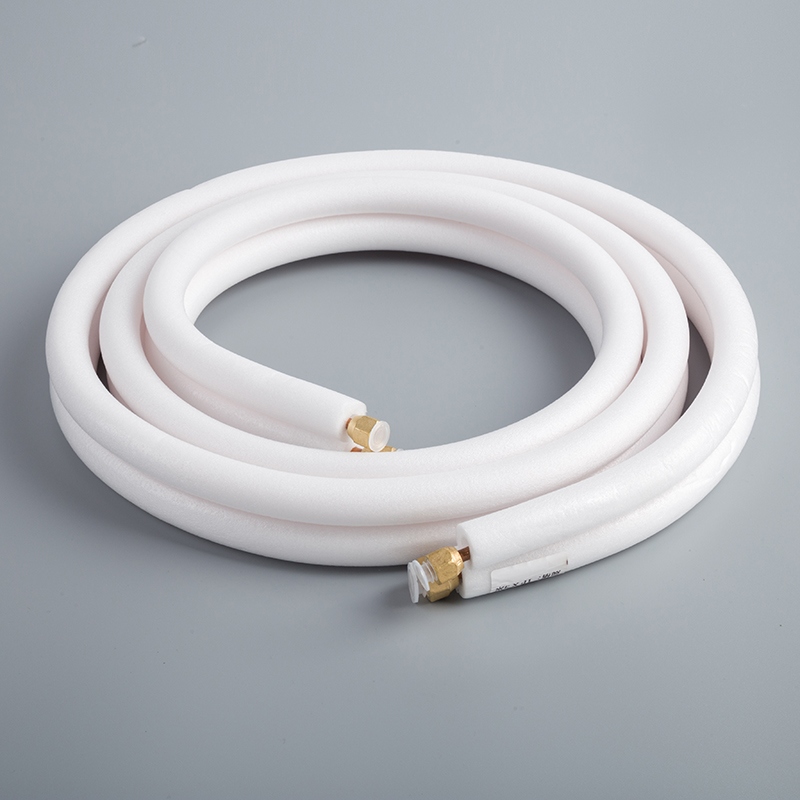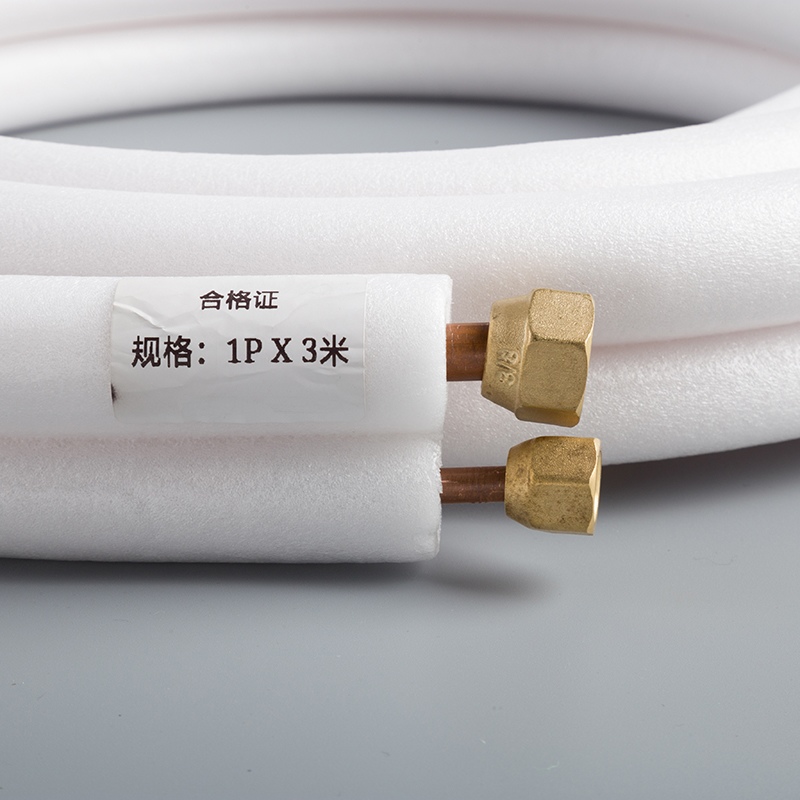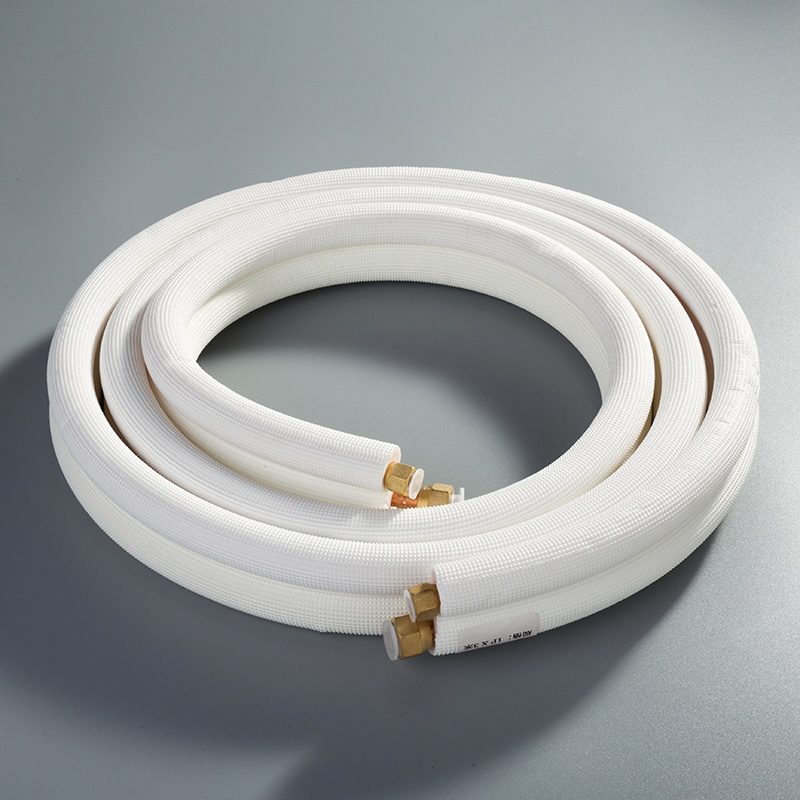Understanding Copper Pipes in Air Conditioning Systems

Copper pipes are essential components in air conditioning systems. They efficiently transmit refrigerants, ensuring your HVAC system operates smoothly. With their excellent thermal conductivity, copper pipes enable effective heat transfer, which is crucial for maintaining the desired temperature in your space. You might wonder, what is the copper line on an air conditioner? It's the backbone of your cooling system, offering stability and flexibility. Copper's durability and resistance to corrosion mean these pipes have a longer lifespan, reducing the need for frequent replacements. This reliability makes the copper pipe used in AC systems a preferred choice for many.
Benefits of Copper Pipes in Air Conditioning Systems
When it comes to air conditioning systems, copper pipes stand out for several reasons. Let's dive into the benefits that make them a top choice for HVAC systems.
Durability and Longevity
You want your air conditioning system to last, right? Copper pipes offer exceptional durability. They resist extreme temperatures and handle high pressure with ease. This resilience means fewer replacements and repairs over time. Copper's natural resistance to corrosion ensures that the pipes won't crack or leak easily. This longevity makes the copper pipe used in AC systems a reliable choice for homeowners and businesses alike.
Thermal Conductivity
Ever wondered why copper is so popular in air conditioning? It's all about thermal conductivity. Copper pipes excel at transferring heat quickly and efficiently. This means your air conditioner can cool your space faster and more effectively. The high thermal conductivity of copper reduces energy consumption, making your system more energy-efficient. So, when you ask, "what is the copper line on an air conditioner?"—it's the component that ensures optimal cooling performance.
Flexibility and Ease of Installation
Installing an air conditioning system can be a daunting task, but copper pipes make it easier. Their flexibility allows for easy bending and shaping, which simplifies installation. You can fit copper pipes into tight spaces without much hassle. This adaptability reduces installation time and costs. Plus, copper's lightweight nature means you won't need heavy-duty support structures. The copper pipe used in AC systems offers both convenience and efficiency during installation.
Types of Copper Pipes Used in Air Conditioning

When it comes to air conditioning systems, choosing the right type of copper pipe is crucial. You might wonder, what is the copper line on an air conditioner? Well, it's the essential component that ensures your system runs efficiently. Let's explore the two main types of copper pipes used in AC systems.
Soft Copper Pipes
Soft copper pipes are known for their flexibility. You can easily bend and shape them without the need for special tools. This makes them ideal for installations where the pipes need to navigate around obstacles or fit into tight spaces. Soft copper pipes are often used in situations where you need to replace or repair existing lines. Their pliability allows for quick adjustments, reducing installation time and costs.
These pipes are typically used for refrigerant lines in air conditioning systems. They provide a seamless flow of refrigerant, ensuring your AC operates smoothly. The copper pipe used in AC systems, especially the soft type, offers excellent thermal conductivity. This means your air conditioner can transfer heat efficiently, keeping your space cool and comfortable.
Hard Copper Pipes
On the other hand, hard copper pipes are rigid and durable. They are often used in situations where the piping needs to withstand high pressure or extreme temperatures. Hard copper pipes are less flexible than their soft counterparts, but they offer superior strength and longevity. You might find these pipes in the main supply lines of an air conditioning system.
Hard copper pipes are typically used in commercial installations where durability is a priority. They resist corrosion and maintain their integrity over time, making them a reliable choice for long-term use. When you ask, what is the copper line on an air conditioner? In many cases, it's the hard copper pipe that ensures the system's stability and efficiency.
Both soft and hard copper pipes play vital roles in air conditioning systems. The choice between them depends on the specific needs of your installation. Whether you need flexibility or strength, there's a copper pipe used in AC systems that fits your requirements. Understanding these types helps you make informed decisions, ensuring your air conditioner performs at its best.
Common Issues with Copper Pipes

Copper pipes are reliable, but like any component, they can face issues over time. Understanding these problems helps you maintain your air conditioning system effectively. Let's explore some common issues you might encounter with the copper pipe used in AC systems.
Corrosion and Pitting
Corrosion is a common issue with copper pipes. You might wonder, what is the copper line on an air conditioner? It's the part that can suffer from corrosion if not properly maintained. Corrosion occurs when the copper reacts with elements in the environment, leading to pitting. This can weaken the pipe and eventually cause leaks.
To prevent corrosion, regular inspections are crucial. Look for any signs of discoloration or pitting on the pipes. Adjusting water chemistry or adding corrosion inhibitors can also help reduce corrosion rates. By taking these steps, you can extend the lifespan of the copper pipe used in AC systems.
Leaks and Cracks
Leaks and cracks are another common issue with copper pipes. You might notice a drop in your air conditioner's efficiency if there's a leak. Increased acidity in water can lead to long-term corrosion, resulting in pinhole leaks. These small leaks can cause significant damage if not addressed promptly.
Regular visual inspections can help you catch leaks early. Check for any signs of moisture or water stains around the pipes. If you find a leak, it's essential to address it quickly to prevent further damage. Sometimes, replacing the affected section of the copper pipe used in AC systems is necessary to restore efficiency.
By understanding these common issues, you can take proactive steps to maintain your air conditioning system. Regular maintenance and inspections ensure that the copper pipe used in AC systems continues to perform optimally. Remember, a little attention goes a long way in preventing major problems down the line.
Maintenance and Troubleshooting Tips
Keeping your air conditioning system in top shape involves regular maintenance of the copper pipes. These pipes play a crucial role in the efficiency and longevity of your HVAC system. Let's dive into some practical tips for maintaining and troubleshooting these essential components.
Regular Inspection and Cleaning
Regular inspections are key to ensuring your copper pipes remain in good condition. You should check for any signs of wear, such as discoloration or pitting, which can indicate corrosion. Catching these issues early can prevent more significant problems down the line.
Visual Checks: Look for any visible signs of damage or leaks. Moisture or water stains around the pipes can signal a problem.
Cleaning: Keep the pipes clean to prevent buildup that can lead to corrosion. Use a soft cloth and mild detergent to wipe down the pipes regularly.
Monitor Performance: Pay attention to your air conditioner's performance. If you notice a drop in efficiency, it might be time to inspect the copper pipes.
Expert Insight: *Copper lines are essential components within HVAC systems, often operating out of sight but playing a crucial role in the overall functionality of these systems.* Regular maintenance ensures they continue to perform optimally.
Professional Servicing
While regular inspections are something you can do yourself, professional servicing is also essential. HVAC professionals have the expertise to identify and fix issues that might not be immediately apparent.
Annual Check-Ups: Schedule annual maintenance with a professional. They can perform a thorough inspection and address any potential problems.
Refrigerant Levels: Professionals can check refrigerant levels and ensure the copper pipes are facilitating efficient heat transfer.
Advanced Cleaning: Technicians have access to tools and solutions that can clean the pipes more thoroughly than regular household methods.
Expert Testimony: According to an HVAC Professional, "Copper tubes make HVAC systems more energy-efficient. Since copper tubes have high thermal conductivity, they require less energy to transfer heat from one point to another." Regular professional servicing helps maintain this efficiency.
By following these maintenance and troubleshooting tips, you can extend the lifespan of your copper pipes and ensure your air conditioning system runs smoothly. Regular care and professional attention keep your HVAC system efficient and reliable, saving you time and money in the long run.
FAQs on Copper Pipes in Air Conditioning Systems
Curious about the copper pipe used in AC systems? You're not alone. Many people have questions about these essential components. Let's dive into some frequently asked questions to help you understand what is the copper line on an air conditioner and how to maintain it.
How often should copper pipes be inspected?
Regular inspections are crucial for maintaining the efficiency of your air conditioning system. You should inspect the copper pipe used in AC systems at least once a year. This helps catch any potential issues early, preventing costly repairs down the line. During these inspections, look for signs of wear or corrosion. If you're unsure about what to check, consider hiring a professional. They can perform a thorough inspection and ensure everything is in top shape.
Expert Tip: While it’s normal for copper pipes to leak on occasion, they shouldn’t leak all the time. If you notice frequent leaks, it’s time to replace your copper pipes. Regular inspections help identify these issues before they escalate.
What are the signs of copper pipe failure?
Recognizing the signs of failure in the copper pipe used in AC systems can save you from unexpected breakdowns. Here are some indicators that your copper pipes might be failing:
Increased Water Bill: A sudden spike in your water bill could indicate a leak.
Decreased Water Pressure: If you notice a drop in water pressure, it might be due to a leak in the copper pipe.
Visible Water Damage: Look for water stains on ceilings or walls.
Blue-Green Stains: These stains often form when water escapes through pinhole leaks, a common issue with older copper pipes.
Testimonial: When water escapes through pinhole leaks in the pipes, a blue-green stain forms. These pinhole leaks, which are difficult to detect, often form when increased acidity in the water causes long-term corrosion.
Can copper pipes be replaced with other materials?
Yes, you can replace copper pipes with other materials, but it's essential to weigh the pros and cons. Copper pipes offer excellent thermal conductivity and durability, making them a preferred choice for many. However, alternatives like PEX or PVC might be suitable for specific applications. These materials can be more cost-effective and easier to install. Before making a decision, consider the specific needs of your air conditioning system and consult with a professional.
Understanding what is the copper line on an air conditioner and how to maintain it ensures your system runs efficiently. By addressing these FAQs, you can make informed decisions about the copper pipe used in AC systems, keeping your air conditioning unit in optimal condition.
Copper pipes are the backbone of your air conditioning system. They ensure efficiency and longevity. By understanding their benefits and types, you enhance your system's performance. Regular maintenance keeps everything running smoothly. Professional servicing prevents common issues. Addressing FAQs helps you make informed decisions. Copper's durability and excellent heat transfer properties make it a top choice for HVAC systems. Its role in reducing energy consumption and minimizing environmental impact is significant. As you maintain your system, remember that copper pipes are essential for keeping your indoor environment comfortable and efficient.
See Also
The Game-Changing Role Of Copper Pipes In Cooling Systems
Reasons To Opt For Copper Pipes In AC Systems
Exploring The Benefits Of Copper Tubing In AC


